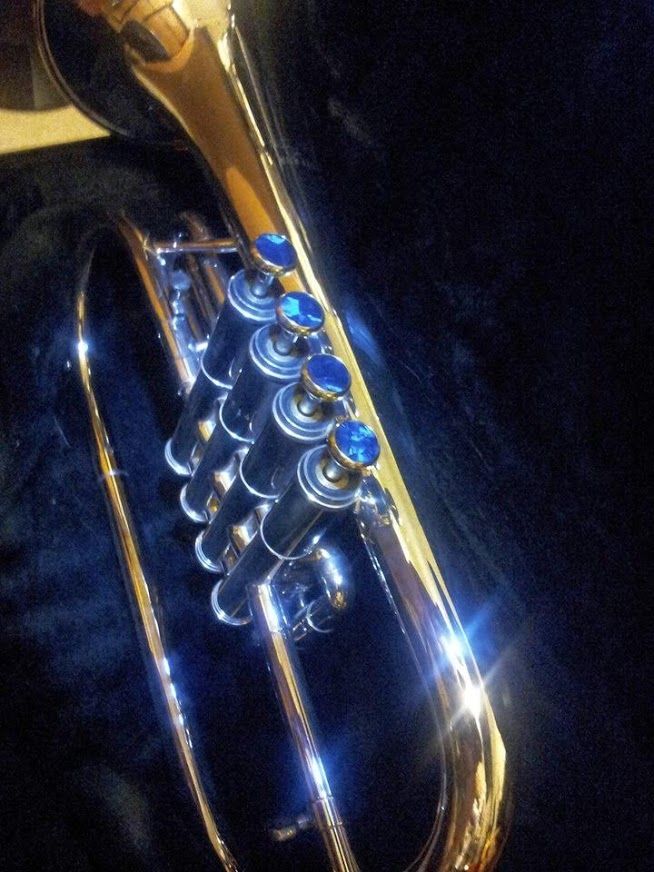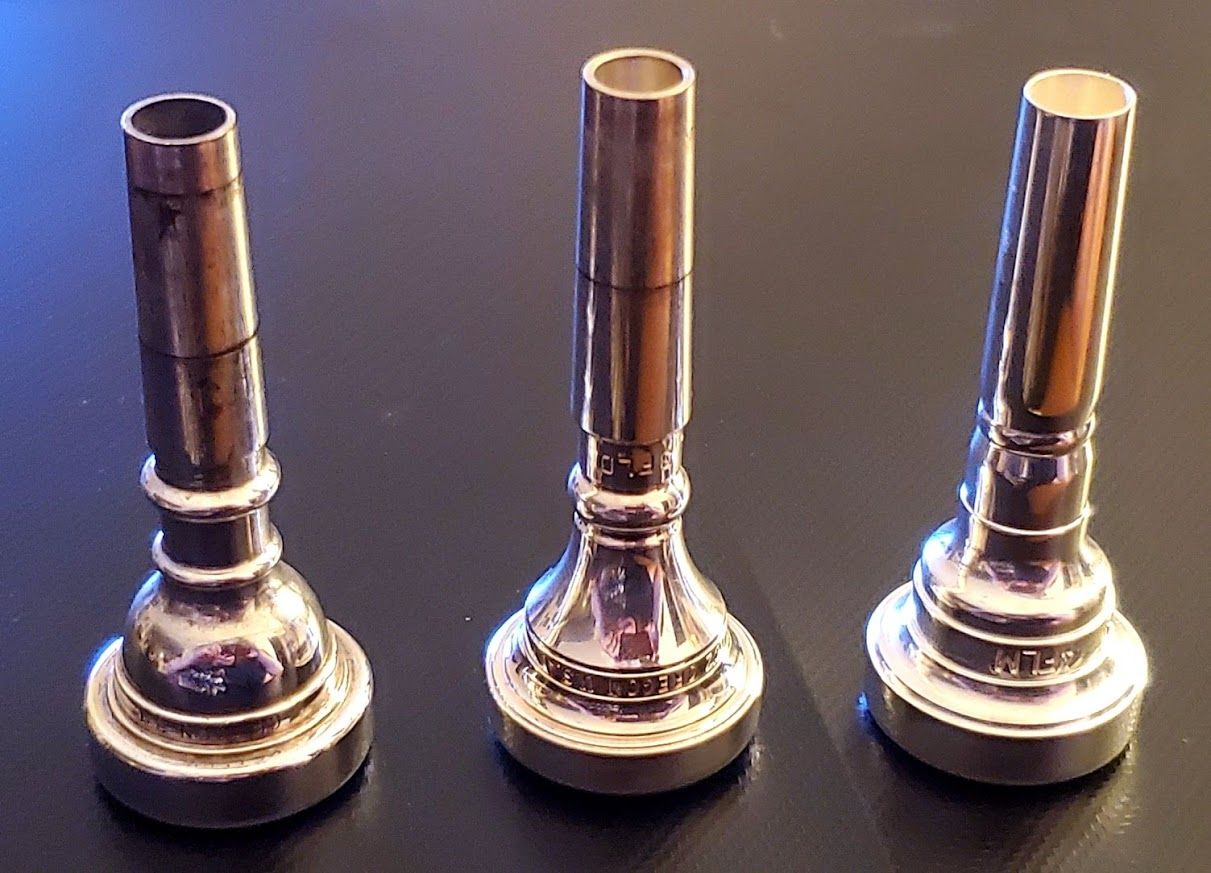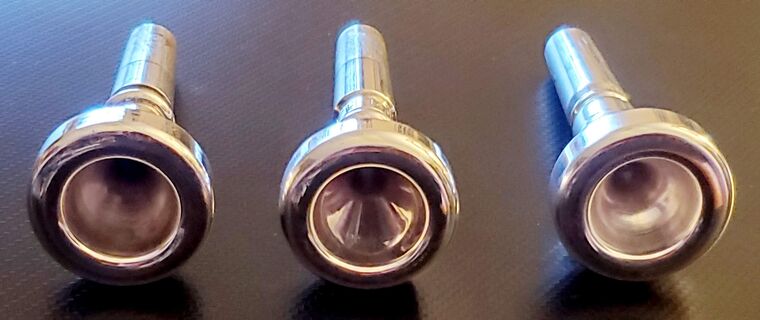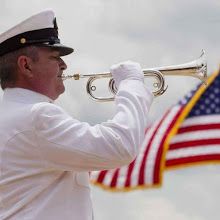It also says "Easy Play" which we all KNOW is a dirty LIE!!! If playing the trumpet was "easy", who would play saxophone?
Posts made by Furcifer
-
RE: Never seen this beforeposted in Vintage Items
-
RE: Which trumpet to buy?posted in Bb & C Trumpets
"Simply easier to play" is Stomvi's ad line, LOL
I played a Bach for decades and wanted something more amenable for what I play now. I went to ITG in 2018 and played over 30 horns. I really thought I was going to end up with a Schilke HC2, HC1, X3, etc. - maybe a Bach large bore Commercial, or maybe even one of the Claude Gordon models. I was blown away when I tried an Eclipse Celeste CLS with the big 6O leadpipe, but I can't justify that kind of expense. I was also surprised to find the most popular Yamaha and Jupiter signature horns a little too tight for me. So I wound up at the Stomvi table, tried everything, and the S3 Big Bell was by far the most responsive horn I had ever played. K.O. Skinsnes is also a great cat to talk to. I'm sure a lot of it is just a better match to me and my mouthpiece, but I have tried a number of horns just in the last year and only a few have ever even pulled up close to it.
Of the choices you mentioned, your best bet by far is to go work with Blackburn if you're right there. I've heard nothing but great things about and out of those horns, and the cats I know that have worked with them at the shop all had a great experience. The leadpipe is probably one of the biggest factors the way I perceive how a horn plays; Blackburn is one of the few that is as famous for leadpipe designs as whole horns.
-
RE: How do I begin to learn "jazz trumpet?"posted in Jazz / Commercial
Kehaulani nailed it - and since "The Goal Note Approach" by Shelton Berg was mentioned - and in reference to the question about "patterns" and "riffs", I knew Shelley, I took improvisation from him before he put it all in that book, and he emphasizes up front that the more successful jazz solo is usually 'a COMBINATION of 'licks' and 'lines'". Repeated licks can build tension, and/or create a melodic basis for the "line" to embellish.
Meanwhile, "The Goal Note Approach" is about focusing on how chord tones resolve (how they have always resolved in the Common Practice Period), as opposed to, say, thinking in terms of "scales" or invoking the needless complexity of 'modality' in music that is, in fact, "Tonal, not modal".
Those who have referred so much to "melody" are, in effect, saying the same thing, because "tonality" and incorporating chord-tone resolution is exactly how a "melody" functions.
Shelley once showed us transcriptions of two Sonny Rollins solos on the same song, played TEN YEARS apart, and Sonny played the SAME turnaround on the 8th chorus in both solos, LOL So the point of that is that you will always be much more likely to "improvise" with elements you have practiced, than suddenly find yourself blessed by the spirit and muse of Dizzy and play something you've never actually played before. Not to say that it never happens, but you probably shouldn't depend on it, LOL
Another thing he always said was "Listen MORE than you play".
-
RE: Good trumpet upgrades?posted in Bb & C Trumpets
@rowuk I didn't say actual "trumpeters" were Bach snobs (although there are some, their opinions are not what counts for very much in the paradigm I'm referring to) - I said there are directors and professors that are. These are people that students have to deal with that are in an authoritative position where they can freely exercise their bias, unchallenged, and students are powerless to argue with them, especially if it's not overt. But I personally know of a number of students over the years who were effectively forced to sell their horn because they were either directly or indirectly informed that they should buy a Bach if they wanted to be competitive - or even just treated fairly at annual collegiate ensemble auditions. On the other hand, I've also never known a student who was ever directly or indirectly pressured to buy any other brand or model in quite the same way.
Bach milked their holy blessing from the Chicago Symphony for decades, even after quality and consistency had more than a few suspect production runs. This bias was and is largely a US phenomenon that has been gradually and thankfully going away - as you say - especially in the professional orchestras, largely as a result of the last 30 years of Yamaha's pro and student market penetration, as you mentioned, and the fact that most of the worldwide trumpet player community is online now and thankfully doesn't, overall, hold with these old-fashioned brand biases anymore. But such purely-professional cultures like pro orchestras are always quicker to change than any level of "education" culture - any public school teacher can attest to their own half of that, LOL
But my point is that there are still a few tenured dinosaurs around the country that can go so far as to literally block a student from finishing a degree, indefinitely, should they happen to get crossed up with them, and playing a horn they don't like, however petty it seems, can end up being just one more strike against them.Then again, if it ever gets to a point where everybody is being told to buy a Yamaha "just to be on the safe side" with orchestral auditions, that's really not a better situation, either. But perhaps it's inevitable. Somebody is going to be recognized as the best player in the best trumpet section in the best orchestra and whatever they play starts becoming a de-facto standard. This is why horn makers curry endorsements from pros, and always will. Everybody who is NOT that "pro", and is unsure, can't really tell a big difference or doesn't have anywhere local to try horns, is more likely to just order what that "pro" plays, OR buy whatever their teacher says to buy, and all he knows is what he himself plays based on what everybody used to say 30 years ago when he was in college, LOL And when you go audition, you either have what the judges "know" to look for - based on that same kind of thing - or you don't. And since everybody auditioning is often more than "good enough", it often comes down to purely subjective hair-splitting.
Here's the funny thing - I'm also a rep for a relatively new brand of high-quality, low-cost school instruments. Our main "beginner" horn is a Yamaha 2335 clone, and our main "intermediate" trumpet is a Bach 37 clone.
All we make are various different grades of "student/intermediate models" - mostly for schools, right? Why did we pick these two models? Again, unspoken de-facto standards. And a lot of that is driven by brand familiarity/loyalty/snobbery or whatever you want to call the general ignorance and fear people have of "other" brands - it amounts to the same thing on the marketing level.
But we're very successful because the simple FACT is that it's not just B&S or Schilke who can copy "the Bach core sound" - or that of just about any other famous, 'preferred' wind instrument model. So maybe that says something about changing attitudes (when the price is right). We found the easiest way to get the Bach sound at a lower cost is to just copy the whole horn, and use higher technology and more automated processes to ensure better consistency. And in fact, our CEO found out that anybody COULD do it - with a relatively high degree of quality - if they just WANTED to - and guess what? Even Bach has incorporated SOME of these things (but not our lifetime warranty!). Bach doesn't make anywhere near as much "in-house" on a Bach Stradivarius as they used to, and every other "Made in USA" brand/model is using the same seven factories in China for everything they can get away with, too - which is quite a bit more than most people are aware of. But whether other brands want to market a "Bach-like" model or an outright clone at all - and what their price point is - depends on their own brand image and business model. Most brands are not strictly in our "school-quality" market niche, and they have a lot more middle-men involved in their supply chains and management.Since you mentioned Selmer - you realize all Bach has to do is put their parent company's roll-stamp on the bell, and suddenly it's a "Selmer", LOL! Same with Conn. They're all the same company. They're just different lines of manufacturing, i.e., just different models now, not really different "brands" anymore. But if they suddenly started stamping "Conn-Selmer-Bach" on all the Strads, Vintage One's and Claude Gordon models, mark my words, it would just be the "Bach line" models that people would lose their minds about and be suspicious of "quality" going to hell (again), LOL And if Conn-Selmer-Bach really admitted what percentage of their parts that are actually made in China, people's heads would explode.
-
RE: Good trumpet upgrades?posted in Bb & C Trumpets
If I had to pick one, I'd go with the Cannonball, hands down. The ones I've tried have all been great playing horns for the money - easily better than the other two you listed - and no doubt better for what I do these days. Full disclosure - I'm a local pro, usually playing the Lead book in rock and big jazz ensembles, with a good enough established residual income that I don't have to depend on it to eat healthy meals or put up with Bach snobs, LOL
But speaking of Bach snobs: For better or worse, you can play whatever you want, and I'm certainly the last to suggest that the ubiquitous Bach 180S37 is the "best horn" for anyone - it may very well not be - and it's definitely not the best horn for me, now. But after playing one for over 40 years before I switched to my current Stomvi a few years ago, it's probably the one brand/model out of everything I've seen and played in all that time that nobody could ever "blame" anything on. All the esoteric bull you'll hear about "blending" is much more often more about the actual actual player's sound concept than the horn, and/or just bias because they'll put their preconceived ideas on hot standby as soon as they see you pull "something else" out of your case. The unfortunate reality is that there is still a lot of bias out there among directors and professors against anything outside of "what they know", and all too often, ALL they think they "know" is that Bach was king for many years, and that you still can't hardly go wrong with them now. Many of them aren't even trumpet players. It makes me nauseous to think about it at times, but there's no denying that the 180S37 is still the "safest choice" for students, because students are always potentially at some dogmatic Bach snob's mercy, who only really knows what they've been told by some other Bach snob. It's actually the most common facade to cover the fact that they do not and never will have a good enough ear and/or an objective enough psychology to ever discern anything else for themselves. And I've unfortunately witnessed far too many students advised to sell whatever they have - some were even magnificent-playing collector horns - to get a Bach. It's never the other way around. But that - and the fact that they still don't sound like Bud Herseth - is how we know it's mostly esoteric dogma. 99.99% of them can't pick out the Bach from ten similar models in a blind test, but they depend on parroting the opinion of that 0.01% to keep anyone else from finding out. And I've also seen students treated as somehow "less serious" until they complied. Yamaha and various others have made serious inroads and accomplished a great deal to help break that down, but it is still a refuge for those who are quite relieved to have it as such.
Good advice in these other comments, too - it's always best to spend your money on lessons and work with a teacher who can help you identify your true playing goals, the models of horns that will help optimize what you do well and better facilitate improvement in weaker areas, help you realize and consider all your current and future playing commitments - including the NEXT schools you are likely to attend in your area - and probably help you find more value for your money in the long run, whatever your budget is.
-
RE: Band Re-start for Fallposted in Lounge
Absolutely not. I've been rehearsing steadily with four different performing groups of at least 12 to 18 people, since at least June of last year, and part of the reason why this was never required for us is quite simply because enough musicians simply refuse. Those masks are dumb and the bell covers are even dumber. I absolutely refuse to put something so stupid on a high quality professional instrument, just as I would refuse to be told what kind of valve oil I must use with it. There is not one single documented case of anyone ever contracting a virus via a wind instrument, in recorded history - and certainly not in the last year. Not even one.
Some who truly believes they are at risk should not be there, period. I really don't blame anyone for making that kind of a choice. I really don't blame anyone for doing anything they truly think they need to do to protect themselves. But I seriously question compliance in violation of one's personal and professional principles - whatever it is. I just can't do it. I won't do it. And nobody can make me. Here's something you CAN believe in: I will still find a way to play with other like-minded professionals who will not compromise their personal integrity either, some other way.
-
RE: Flugel Threadposted in Flugelhorns & Cornets
Ah, nice to see afficionados of the big Getzen 896S 4-valve square-bow. Got mine new in '86, rather serendipitously. I just wanted a flugel - didn't even care what brand. I was in college, swamped with work, hating the fact that I didn't have a flugel for solos in the two jazz ensembles I felt rather fortunate to have landed a spot in within my first year, and so the folks went and talked to my old teachers back home and somehow got redirected around to getting what was an odd beast for me at the time. Since then, I've come to love and prefer it over the whole 3-valve/smallbore flugel concept in general. They may be better at certain studio things and be quite wonderful instruments for small combos, but the big ol' Getzen is an easier-projecting leader when the whole section is in flugels, holds its own better in a LOUD 12pc cover band doing Tower of Power/Chicago/BST charts, and comes in right handy for French horn parts on Kenton charts, LOL
So I just played the Getzen 3C flugel mouthpiece it came with for years, and didn't think much about it. Then as a comeback player about six years ago, I got to thinking that many things must have improved in all this time, so I searched and researched and came up with the Marcinkiewicz 3FLD. It was like a whole other horn - suddenly all this amazing response! I love Marcinkiewicz rims anyway - my main trumpet mouthpiece is the E14 B. Shew #1. I really like as much contrast as I can get between trumpet and flugel so this deep cup is glorious and the notes just jump out of the horn, within the reasonable range of a flugel, anyway... My test for that is whether the high D still "feels so good" or not, LOL
But we're working up some real chop killers to be able to run 2 or 3 sets in a night, so since Terry Warburton had a huge sale a few weeks ago, I finally ponied up the ching for one of his - a 4FLM. This one is a bit brighter - the "M" denotes his "medium" flugel cup - but it slots a lot easier than the big deep cup for extended solos and/or those rare occasions over high D on a flugel. Taking it up to E and F, etc. above that is just no problem with it - which may well come in handy for a louder band and blown chops in the very near future.



-
RE: Bugles Across Americaposted in Announcements
Since I just joined and saw this, I thought I'd pile on. I have been volunteering with BAA since its inception. A number of my recurring annual gigs came from those contacts and just the word getting around - in fact, my last gig and another I will be performing at a memorial service this week were a result of such direct contacts. The point is, the more we can accomplish together in serving these missions, the more good things tend to come back our way. I have not found where cynicism about this, regardless of how legitimate, has ever really served to accomplish anything. Thanks to everybody who contributes their time and talent to this endeavor.
